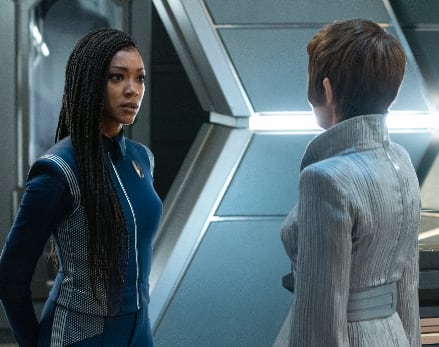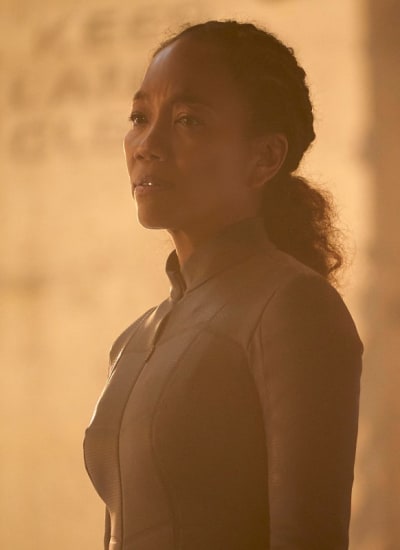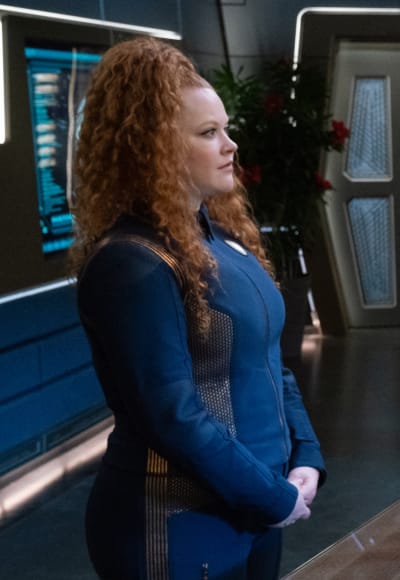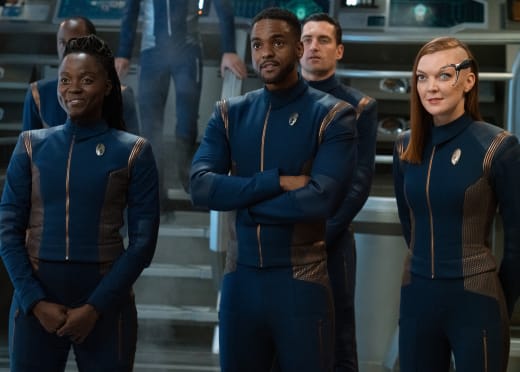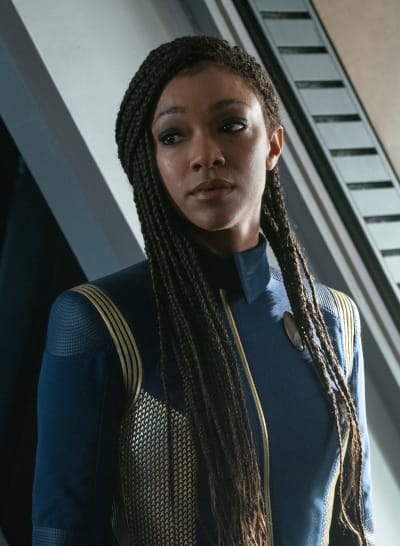For an episode lacking both Reno and Georgiou, Star Trek: Discovery Season 3 Episode 7 did pretty okay at keeping me engaged by throwing a few clever curveballs in with the almost-overly introspective moments.
From Tilly’s job offer to Mommy Burnham’s appearance to Burnham’s own “ah-ha” moment of correcting her impulse, there is a theme of growth running through the various characters’ storylines.
The title “Unification III” ties the narrative to Star Trek: The Next Generation Season 5 Episodes 7 and 8 which were called, respectively, “Unification, Part 1” and “Unification, Part 2” in which Picard and Data travel to Romulus to determine if Spock has defected.
In it, the ambassador’s goal to unify Vulcans and Romulans is revealed and, as Burnham sees in the archive, he accepts that unification will take more than diplomacy and politics. It will require the people to grow.
So that brings us to the end game of his vision with both Romulans and Vulcans co-existing on the planet once named Vulcan but renamed Ni’Var, presumably to create a neutral ground for the combined society to develop.
What was noticeably absent in the history lesson was the destruction of the Romulan homeworld in 2387. Of course, it would a matter of record for Burnham or Saru to acquaint themselves with if they were interested.
This omission is only interesting to me because, with the Qowat Milat being introduced, that whisper of suspicion that the Treks are building to an Avengers-like convergence gets a little louder.
The sisters of the Qowat Milat bind themselves to lost causes. And, right now, there’s no cause more lost than yours.
Gabrielle Burnham
But taking the Qowat Milat as a simple device to bring Gabrielle Burnham into play, let’s just nod and smile that someone’s trying to color in the consistency.
I’m not totally convinced that Gabrielle Burnham will ever take to absolute candor naturally despite her Qowat Milat credentials, but she’s got uncomfortable truths down pat.
Keen observers will note that Dr. Burnham worked on the Red Angel suit for an agency more like the Tal Shiar than the warrior nuns. And she certainly hasn’t lost her filter, unlike Star Trek: Picard‘s Elnor who seems to never have had one.
And, once again, we have Burnham not only doubting herself but presenting a much wider range of emotion and reaction than we ever saw in Seasons 1 and 2.
Distinguished peers, let me speak truth to you because she is unable to. She did not have the childhood I would’ve wished for her. I orphaned her. She may have grown up here but she was never Vulcan. She is human, through and through. And being human, she is governed by emotion and a desire to insinuate herself into certain matters of import to fill that emotional void. I maintain that that void has made her vulnerable to manipulation at the hands of the Federation.
Gabrielle Burnham
Her reactions to her mother throwing her under the proverbial bus in front of the quorum, the president, her captain, and the representatives of the Science Academy were expressive of disbelief and outright shock.
Having Burnham’s record of mutiny and insubordination listed like that also reminds us that, despite her messianic tendencies and Vulcan upbringing, our intrepid hero is by no means a rule follower.
(It did occur to me that it would’ve been AMAZING if our Emperor G had made an appearance just when Gabrielle mentioned Captain Georgiou’s death.)
While Burnham was coming to terms with being an unfamiliar person in familiar surroundings, Tilly was offered the chance to be herself in new circumstances.
Duty and joy go hand in hand. Duty is there so you can continue to pursue your happiness. And joy is there so that you have something real to fight for.
Gabrielle
Tilly was the obvious choice as I mentioned on Star Trek: Discovery Season 3 Episode 6, with moments of foreshadowing from Star Trek: Discovery Season 3 Episode 2 and throughout the season so far.
I appreciated that the character stayed true to form and was insecure enough to need reassurance from… well, EVERYONE.
To be fair, she asked a pretty canny question of Saru point-blank.
Tilly: Sir, are you asking me because I’m qualified or because I’m compliant?
Saru: I’m asking because I believe this is in the best interests of our ship.
And Saru answered candidly and with faith in her. He’s really been her biggest fan this season.
Stamets, on the other hand, wasn’t nearly as supportive but true to form nonetheless.
Stamets’s confidence in his own ability and worth is the stuff of epics.
I mean, the confrontation with Detmer and his connection with Adira have gone a ways towards humanizing him but he’s still got a gigantic ego.
Honestly, the notion of taking orders from you is deeply, deeply weird. Almost disturbing.
Stamets
But, call it a knock-on effect from his relationship with Culber or maybe a side-effect of navigating the mycelial network, he sometimes has some impressive insight.
Bringing the crew together to for the “cool Say Yes thing” was better than any surprise birthday party.
Even if Burnham arrived late.
And that brings us full-circle to Burnham whose growth here was symbolized by the simple fact she could admit she’d made an error and then, effectively, corrects it.
She, quite literally, unrang the bell. Or gong. Whatever.
Unlike the rogue mission to save Book and the Battle of the Binary Stars, the t’kal n’ket (spelling guess), being a scientific debate, is a controllable encounter.
It lends itself to deep thought and analysis and Burnham takes that opportunity to see the long-ranging effects of the path she impulsively took by invoking t’kal n’ket, without consulting or confering with Saru.
So, perhaps for the first time since we met her, Michael Burnham actually acknowledged the error of her decision and stepped back.
T’Rina: You represent the Federation yet you invoke Ambassador Spock who left it behind.
Burnham: Doesn’t mean he didn’t love it. And it doesn’t mean he wouldn’t have returned someday.
Of course, it worked out and somehow Spock’s legacy and memory became credited to her which made me cringe slightly.
However, as you watch Star Trek: Discovery online, note the repetition of the phrase “bigger than us” as well as the turning of canon on its head.
T’Rina: In its desire to serve the many, the Federation ignored the needs of the few.
Saru: Did your ancestors not coin the phrase,’The needs of the many outweigh the needs of the few’?
T’Rina: When the people of Vulcan welcomed the Romulans home, we were forced to confront centuries of mistrust and brutality on both sides. Over time and with much effort, we earned the wisdom to know when to let go of maxims and proverbs.
As they are no longer a lost cause, Burnham and Discovery are apparently climbing towards their twinned goals of solving The Burn and rebuilding the Federation.
So who has money down on a Burn theory?
Was it the Red Angel suit?
Was SB-19 a contributing factor?
Will Control or the AI-verse re-emerge as a big bad? Because, if you think about it, with the exception of that annoying Emerald Chain, we haven’t really had villain on the scene yet.
Log your thoughts in the comments!
Diana Keng is a staff writer for TV Fanatic. Follow her on Twitter.

